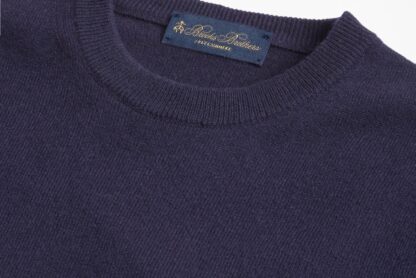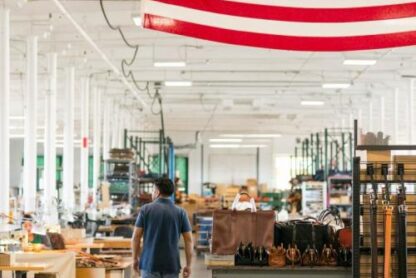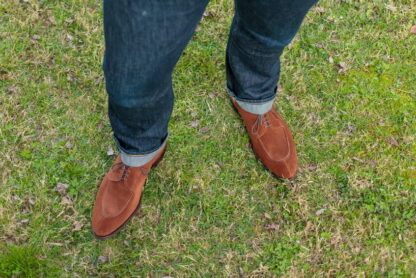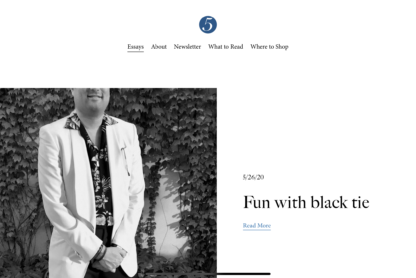I’ve got this theory about men, particularly American ones, and why they tend to frown upon dressing up: Our history of being men of action. Frontiersmen; homesteaders; cowboys. We fight for our women, we protect our households (with firearms if necessary), and we aren’t afraid to get dirty. It feels inherently un-manly to be worried about getting dirty because your jacket is dry clean only; or that your pants are white. If a tire needs changing, get out there and change it—never mind the dirty road.
Recently I was debating whether I wanted to get some covert twill trousers to wear in the wintertime, to alternate with my flannels. Covert twill is a sturdy weave of wool that was originally used during hunting trips by the British aristocracy, favored for being snag-resistant and having natural give to it. Yet despite their historical sturdiness and knowing that they would be stylish, long-lasting and go with everything I own, I ultimately decided not to. Why? Because they’re dry clean only, and thus I knew in my heart of hearts, I simply wouldn’t wear them very often.

Balancing the utility of clothing with its style is the number one most important consideration I think men need to learn to make. I think most people mistakenly think of utilitarian clothing as vests with a thousand pockets, cargo pants, convertible zip-off nylon quick-dry pants and other decidedly un-stylish things. But in reality, utility is derived from the circumstances of your life.

Sure, if you need a thousand pockets to store lots of little things that you access regularly during the day, maybe a fishing vest is the ideal garment for you. But if not, there are a whole range of things you can wear that will serve the utilitarian needs that you have, just fine. And that means that you are free to explore more stylish options within those parameters. Back to my trouser decision: since I work from home and am also a dad to a toddler, dry-clean-only trousers just make no sense (particularly in lighter colors, like I was looking to get). And since they weren’t a need for me (in that I have a well developed wardrobe that I’m very happy with already), I decided the money spent on those would be better spent on something I would wear more often. Instead, even a pair of white jeans makes more sense—yes, they’ll stain just as easily, but since I could also immediately treat a stain with some Tide if necessary, it’s a much lower risk.
Sometimes it can be hard to strike this balance because the way you want to dress makes no sense for your life. Back when I was a university student, I had a job as an IT guy at a medium sized business in my hometown. The job often required I get on the floor or in dusty corners to run cable or install a new workstation. That was the job I had when I first started getting interested in tailored menswear. I started wanting to dress nicer, but couldn’t because of the physical demands of my job. If I had stayed in a position like that for longer or sought a career down that path, I no doubt would’ve spent time figuring out what type of garments offered practical utility, that fit in my office dress code, but were stylish and still made me feel cool.
I still chuckle at the well-trod cartoon twist on that old adage to dress for the job you want, not the job you have, wherein a man is dressed like Batman in an office setting. It illustrates how taking no consideration of utility for your wardrobe is ultimately silly. Years ago I recall reading an editorial from Jim Nelson back when he was at GQ about how his stylish slim-fit dress trousers split when he was getting into a cab. He made the point that pleats, at that point extremely out of favor, do have some arguments going for them. If we only ever make aesthetic considerations in what we wear, there will eventually come a moment where you are grossly unprepared for something and will suffer for it.
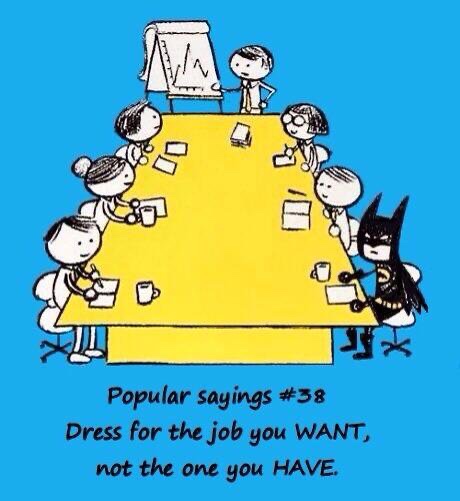
Of course this doesn’t preclude buying totally unnecessary and impractical clothes that you get a lot of joy out of. As Mark Cho, founder of men’s clothing retailer The Armoury recently commented, only buying things for their versatility is overrated. That should come later, in my view, after you’ve built a wardrobe you can dress everyday in.
So my advice, particularly when you are first beginning to build your wardrobe, is to really consider your life, and to balance the utilitarian needs you have with your aesthetic desires.



